- Home
- Beverly Barton
Silent Killer
Silent Killer Read online
SILENT KILLER
If anyone noticed her, they would think nothing of seeing her inside the gazebo alone. No one must ever suspect the truth. If anyone discovered her identity, they would put an end to her righteous executions.
No one could help her. No one could change the past. But she had the power to change not only her future, but the future of others. She must be the protector of the weak and defenseless, those without the power to overcome their oppressors. By slaying those who did not deserve to live, she could wash away her own sins, the sin in which she had been born.
Only men were capable of the kinds of carnal evil that required death by fire. Although not blameless, women were to be spared until the final day of judgment.
“Will I visit Dewan Phillips next?” she asked aloud. “Or is it time to strike against Donnie Hovater?”
She prayed in earnest until her knees ached and tears streamed down her face. And then, finally, God spoke to her. Softly. Quietly. As gentle as the rustle of the wind. But she heard him.
“Yes, of course,” she whispered. “I knew in my heart that he would be next. And yes, I will not wait. I will mete out his just punishment tomorrow night….”
Books by Beverly Barton
AFTER DARK
EVERY MOVE SHE MAKES
WHAT SHE DOESN’T KNOW
THE FIFTH VICTIM
THE LAST TO DIE
AS GOOD AS DEAD
KILLING HER SOFTLY
CLOSE ENOUGH TO KILL
MOST LIKELY TO DIE
THE DYING GAME
THE MURDER GAME
COLD HEARTED
SILENT KILLER
Published by Zebra Books
SILENT KILLER
BEVERLY BARTON
KENSINGTON PUBLISHING CORP.
http://www.kensingtonbooks.com
Contents
Prologue
Chapter One
Chapter Two
Chapter Three
Chapter Four
Chapter Five
Chapter Six
Chapter Seven
Chapter Eight
Chapter Nine
Chapter Ten
Chapter Eleven
Chapter Twelve
Chapter Thirteen
Chapter Fourteen
Chapter Fifteen
Chapter Sixteen
Chapter Seventeen
Chapter Eighteen
Chapter Nineteen
Chapter Twenty
Chapter Twenty-one
Chapter Twenty-two
Chapter Twenty-three
Chapter Twenty-four
Chapter Twenty-five
Chapter Twenty-six
Chapter Twenty-seven
Chapter Twenty-eight
Chapter Twenty-nine
Chapter Thirty
Chapter Thirty-one
Chapter Thirty-two
Chapter Thirty-three
Chapter Thirty-four
Chapter Thirty-five
Prologue
Catherine Cantrell loved her husband. She hadn’t always loved Mark, not in the beginning. But day by day, month by month, year by year, she had grown to care for him deeply. He had become her best friend as well as her husband. She only hoped that she was a worthy helpmate. God knew she tried her best to be everything he wanted in a wife.
The oven timer chimed, reminding her that the apple pie she had prepared from scratch was done. As she donned a pair of oven mitts, Mark breezed into the kitchen. When she smiled warmly at him, he returned her smile. She opened the oven door, reached inside and removed the hot pie, then set it on a cooling rack atop the granite counter.
“Something smells good,” he told her as he placed his empty coffee mug in the dishwasher.
“Apple pie for dinner,” she said.
When he nodded approval, something inherently feminine within her longed for him to touch her. She needed a kiss on the cheek or a pat on the butt or a little hug around her shoulders. Any basic act of affection would do. But Mark was not the affectionate type. She should have accepted that fact long ago. After all, it wasn’t as if they were newlyweds or a couple who had been and always would be madly in love. But they did have a solid marriage, one based on mutual respect and admiration. That was far more than most couples had.
“How’s next Sunday’s sermon going?” Catherine asked.
“Not well. For some reason I can’t seem to keep my mind on my work this afternoon.”
On Mondays, Mark worked at home instead of his office at the church. And she was home on Mondays, too, since she and her business partner, Lorie Hammonds, closed their antique store on Sundays and Mondays.
“You were up late last night with the Jeffries family. I heard you come in after midnight.” Catherine removed the oven mitts, stuffed them into the drawer with the pot holders and turned off the oven. “And you were so restless that I doubt you got more than a few hours’ sleep. Maybe you need an afternoon nap.”
“I couldn’t get that family off my mind,” Mark admitted. “It’s been difficult for Debbie and Vern coping with the loss of their only child. It has truly tested their faith.”
“Losing a child has to be the worst thing that could happen to a person. If anything ever happened to Seth, I don’t know what I’d do.”
“If, God forbid, that ever happened, and we lost our only child, we would do what I’m trying to get Debbie and Vern to do—put our trust in the Lord.”
Catherine sighed quietly. A good minister’s wife would never question God’s plan for each of His children. But in her heart of hearts, she knew that if she ever lost Seth, she would die. Her son was her heart and soul.
When Mark looked at her, apparently wanting a reply to assure him that they were in agreement, she avoided making direct eye contact with him. She didn’t doubt Mark’s love for Seth, but she also knew that her husband would never love their child as much as she did.
“Catherine—”
The distinct doorbell chime saved her from having to either lie to her husband or disagree with him and be lovingly chastised for her lack of faith.
“I’ll get it,” she said. “Why don’t you go in the den and take a nap?”
“Maybe later. I’ll get the door. It could be FedEx delivering my birthday present.”
Catherine smiled indulgently. “We just ordered that new set of golf clubs two days ago. They probably won’t arrive until next week.”
“A man can hope, can’t he?”
Laughing softly, she shook her head as Mark, whistling to himself, hurried out of the kitchen. Her husband had four great loves: God, his family, his parishioners and golf.
She doubted that his much-anticipated fortieth birthday present had arrived so soon. More than likely their visitor was not FedEx but instead her mother, who had phoned shortly after lunch to ask if she could drop by on her way home from her weekly trip to the grocery store.
Catherine wiped her hands on a dish towel, laid it aside and removed her apron. She was a messy cook and had learned early on the necessity of wearing protective covering when she baked.
As she opened the kitchen door and made her way toward the foyer, she thought she heard the murmur of voices. Mark was talking to someone, but she couldn’t tell if the visitor was male or female.
Just as she turned the corner in the hallway that led her by the staircase, an agonized scream echoed through the house. Shock waves shivered along her nerve endings. Dear God! Who was screaming in such pitiful torment?
She rushed into the foyer, planning to help Mark comfort the poor soul in misery. The front door stood wide open. Outside, on the front porch, Mark’s six-foot body writhed in agony as lapping flames consumed his clothes and seared his flesh. Momentarily transfixed by the in
conceivable sight, Catherine screamed as she realized her husband was on fire. Forcing her shock-frozen legs to move, she ran out onto the porch, yelling at him, telling him to drop and roll, which he did. While he lay on the concrete porch floor, hollering with excruciating pain, she grabbed the doormat and beat at the dying flames eating away his clothing.
She dropped to her knees beside him, inspecting his charred body.
Oh God, God!
He was no longer screaming. He lay silent and unmoving. But he was still breathing. Just barely.
“Hang on, Mark. Hang on.”
She jumped up, ran into the house, grabbed the extension phone in the living room and dialed 911. Barely recognizing her own weak, quivering voice, Catherine managed to hold herself together long enough to give their address and tell the dispatcher that her husband was severely burned over his entire body.
She carried the phone back onto the porch and sat down beside Mark. He was still breathing. Still alive. But she didn’t dare touch him. There wasn’t a spot on him that wasn’t badly burned. His face was charred beyond recognition, his flesh melted as if it had been made of wax.
Merciful Lord, please help Mark. He’s such a good man. Ask anything of me and I’ll give it—just take care of him.
Chapter One
Jackson Perdue stopped his car in front of the old home place. The last time he’d been here, five years ago, had been for his mother’s funeral. He had stayed in Dunmore three days, and that had been three days too long. Both he and Maleah had booked rooms at the Hometown Inn. Their stepfather had invited them to stay at the house, but Jack knew that Nolan had been relieved when they both declined his reluctant offer. When he left town, he had felt certain he would never return.
Never say never.
Things change. Life doesn’t stay the same. Nolan Reaves was dead. The old bastard had keeled over in his workshop behind the house eight months ago. Heart attack.
Funny thing was, Jack had thought the son of a bitch didn’t have a heart.
Neither he nor Maleah had come back to Dunmore for the funeral. He didn’t know who had hated their stepfather more, he or his sister.
Maleah had come down from Knoxville six months ago, hired a realtor and put their mother’s home up for sale. With the economy heading into a recession and real estate moving at a snail’s pace, there hadn’t been any offers on the three-story Victorian that had been in his family for four generations.
Jack turned off the engine, snatched the keys from the ignition and opened the driver’s side door. When his feet hit the pavement, he stretched to get the kinks out of his back and neck and pocketed the keys. Rounding the hood, he stepped up on the sidewalk and stared at his childhood home. His thoughts went back to a time when this place had housed a happy family, when his world had been filled with love and laughter. Before his father had been killed. Before his mother had married Nolan Reaves.
Jack left the city sidewalk and moved onto the brick walkway that led to the front porch. He stopped halfway to the porch and looked up at the windows on the left side of the second story, where his old room was located. He doubted anything of his remained. When they’d been here briefly for Mama’s funeral, he had gone no farther than the downstairs parlor. For the first twelve years of his life, this old house had been home. And for the next six years, it had been hell.
Could he actually live here again? Even if he got rid of everything that reminded him of his stepfather, he couldn’t erase the memories.
He hated the cold, austere gray color Nolan had insisted the house be painted. Mama had wept quietly when the drab gray and white covered the beautiful green, cream and rose that the house had been for generations, colors true to the time period. If he actually moved into the house, the first thing he would do was hire painters to take the Victorian back to her colorful roots. He would have the house repainted—for his mother.
“God knows I’ll never move back to Dunmore, but if I did, I wouldn’t live in that house,” Maleah had told him. “As far as I’m concerned, the house is yours if you want it.”
But that was the million-dollar question: Did he want it?
Maybe. He didn’t have to decide right away. He could stay here a few weeks and see how it went. It was either that or rent a motel room by the week. Not a pleasant prospect. Besides, if his new job didn’t work out, it would be easier to move on if he hadn’t leased an apartment or a house.
He had been at loose ends when Mike Birkett phoned and offered him the job. Otherwise, he probably wouldn’t have considered coming back to Alabama. He had been honorably discharged from the army last year, after four months in the hospital recuperating from a bomb explosion that had nearly killed him. The surgeons had reconstructed the left side of his face, neck and shoulder and had done a damn good job. Only those who had known him before the reconstruction would suspect that he’d been put back together piece by piece.
“Hey, the job is yours if you want it,” Mike had told him. “The pay isn’t much, but it’s in line with the low cost of living in Dunmore.”
“Let me think about it.”
“Come home. Take the job. Let’s get reacquainted. If after a few months you hate it, you can always quit.”
In the end, Mike had convinced him to give it a try. He’d known his old buddy had pulled a few strings to get him okayed for the position. Even though he was in really good physical shape now, he’d never be 100 percent ever again. Jack wasn’t sure he’d make a good deputy just because he’d been a top-notch soldier, but God knew he needed something to do, something to keep him sane.
He stepped up on the porch, faced the front door and paused. After taking a deep breath, he removed the house key from his pocket. He unlocked and opened the door, then walked inside. A whiff of muskiness hit him the moment he entered the foyer. The house needed airing out after being closed up for so many months. First thing in the morning, he’d open every window in the place. Since it was spring and the temps were in the seventies, it was the perfect time.
As if his feet were planted in cement, he found it impossible to move beyond where he stood just over the threshold. Glancing in every direction—left, right, up and down—he clenched his teeth together tightly. He could feel Nolan’s presence, could even smell a hint of the pipe tobacco his stepfather had used. Maybe this was a huge mistake. Maybe he’d been wrong to think that he could live here. It wasn’t too late to turn around, walk away from the house and rent a room for tonight.
God damn it, no! He wouldn’t let Nolan run him off, not the way he had when Jack was eighteen. Nolan was dead. Jack was thirty-seven, a decorated war hero, and this house was his now, his and Maleah’s, as it had once been their mother’s. If it was the last thing he ever did, he intended to erase Nolan Reaves from their ancestral home, starting with the old carriage house where their stepfather had doled out his own unique brand of punishment.
Catherine Cantrell had asked her best friend, Lorie Hammonds, to drive her by her old home, just outside the city limits. She and Mark had lived there for nearly six years before his death eighteen months ago.
“Are you sure you want to do this?” Lorie asked.
“I’m sure. I have to face the past sooner or later.”
“But does it have to be today?”
Cathy sighed. Yes, it had to be today. One of the many things her therapist at Haven Home had taught her was that putting off unpleasant things didn’t make them go away. The sooner she faced it, whatever “it” was, and dealt with it, the sooner it ceased to be a monster hidden in a dark closet ready to pounce on her when she least expected it.
Lorie got out of her Ford Edge, went around the hood and met Cathy as she stood at the border of the street, her gaze scanning the porch. This was where Mark had been doused with gasoline and set on fire. This was where she had waited with him, praying with every breath, until the ambulance arrived. This was where her safe, contented life had ended. Eighteen months, three weeks and five days ago.
E
very nerve in her body shivered; every muscle tensed. With her eyes wide open, she could see Mark as he had been that horrible day, his flesh charred, melted, his life draining from his body. She could hear his agonized screams and then the deadly silence that had followed.
She closed her eyes and took a deep, fortifying breath.
Lorie put her arm around Cathy’s quivering shoulders and gave her a reassuring squeeze. “Come on. Let’s go.”
Cathy opened her eyes and shook her head. “Not yet.”
“Don’t do this to yourself. Enough’s enough.”
“I imagine the new minister’s wife redecorated,” Cathy said. “No woman wants to live in a house decorated by a former owner.”
“The new minister is a widower with a teenage daughter. No wife.”
“All the same, this isn’t my house any longer. My things aren’t here. The home I created with Mark is gone.”
“Your furniture and other things are in storage,” Lorie reminded her. “When you buy a new place, you can—”
She turned quickly and faced her oldest and dearest friend. “Thank you for letting me stay with you until I find a place.” Lorie and she were BFF—best friends forever—their friendship going back to when they wore diapers. Their parents had been good friends, and they had lived only blocks apart when they were growing up.

 The Dying Game
The Dying Game Dangerous Deception
Dangerous Deception The Outcast tp-3
The Outcast tp-3 Beverly Barton Bundle
Beverly Barton Bundle Egan Cassidy's Kid
Egan Cassidy's Kid After Dark
After Dark Keeping Baby Secret
Keeping Baby Secret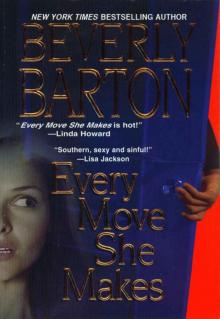 Every Move She Makes
Every Move She Makes Dead By Nightfall
Dead By Nightfall As Good As Dead (Griffin Powell Book 4)
As Good As Dead (Griffin Powell Book 4)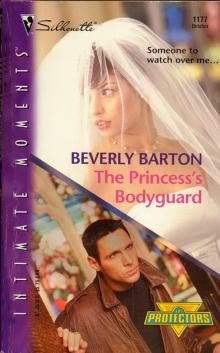 The Princess's Bodyguard
The Princess's Bodyguard JACK'S CHRISTMAS MISSION
JACK'S CHRISTMAS MISSION In the Arms of a Hero
In the Arms of a Hero PALADIN'S WOMAN
PALADIN'S WOMAN Lone Wolf's Lady
Lone Wolf's Lady Emily And The Stranger
Emily And The Stranger Don't Say a Word
Don't Say a Word LAYING HIS CLAIM
LAYING HIS CLAIM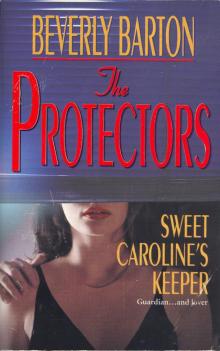 Sweet Caroline's Keeper
Sweet Caroline's Keeper Nine Months Part 1 (36 Hours)
Nine Months Part 1 (36 Hours) The Tender Trap
The Tender Trap Downright Dangerous
Downright Dangerous Determined to Protect, Forbidden to Love
Determined to Protect, Forbidden to Love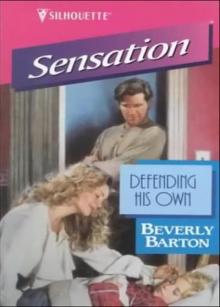 DEFENDING HIS OWN
DEFENDING HIS OWN Lone Star Country Club: The Debutantes
Lone Star Country Club: The Debutantes Nine Months Part 3 (36 Hours)
Nine Months Part 3 (36 Hours) Coldhearted
Coldhearted Witness
Witness Navajo's Woman
Navajo's Woman GABRIEL HAWK'S LADY
GABRIEL HAWK'S LADY Faith, Hope and Love
Faith, Hope and Love 12 Stocking Stuffers
12 Stocking Stuffers Grace Under Fire
Grace Under Fire MURDOCK'S LAST STAND
MURDOCK'S LAST STAND Paladin's Woman tp-2
Paladin's Woman tp-2 Dead By Morning
Dead By Morning Killing Her Softly
Killing Her Softly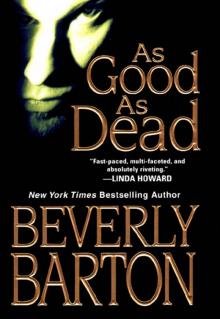 As Good as Dead
As Good as Dead Amnesia
Amnesia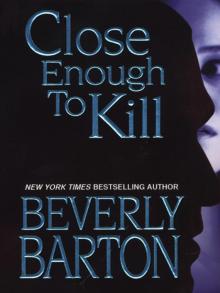 Close Enough to Kill
Close Enough to Kill This Side of Heaven tp-1
This Side of Heaven tp-1 Her Secret Weapon
Her Secret Weapon His Only Obsession (Protectors #27)
His Only Obsession (Protectors #27) The Rebel's Return
The Rebel's Return The Fifth Victim
The Fifth Victim Ready for Anything, Anywhere!
Ready for Anything, Anywhere! Nine Months Part 2 (36 Hours)
Nine Months Part 2 (36 Hours) A Child of Her Own
A Child of Her Own Beg to Die
Beg to Die Raintree: Santuary
Raintree: Santuary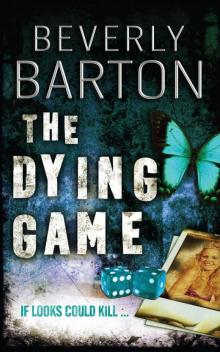 Beverly Barton 3 Book Bundle
Beverly Barton 3 Book Bundle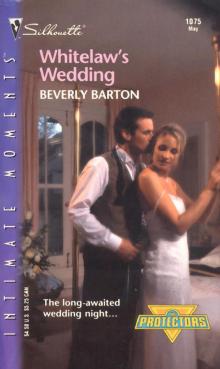 WHITELAW'S WEDDING
WHITELAW'S WEDDING What She Doesn't Know
What She Doesn't Know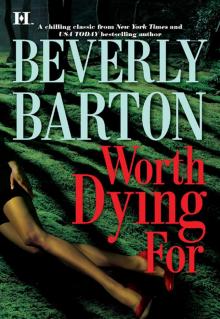 Worth Dying For
Worth Dying For Til Death Do Us Part
Til Death Do Us Part The Right Wife
The Right Wife His Only Obsession (Protectors Book 27)
His Only Obsession (Protectors Book 27)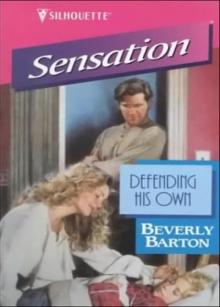 Defending His Own tp-4
Defending His Own tp-4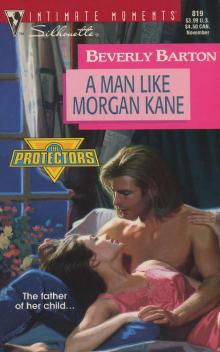 A MAN LIKE MORGAN KANE
A MAN LIKE MORGAN KANE Nine Months
Nine Months If Looks Could Kill
If Looks Could Kill Nothing but Trouble
Nothing but Trouble Silent Killer
Silent Killer RAMIREZ'S WOMAN
RAMIREZ'S WOMAN Guarding Jeannie tp-5
Guarding Jeannie tp-5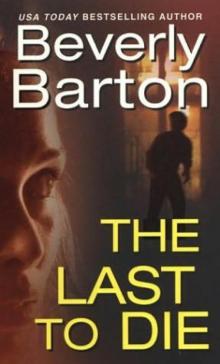 The Last To Die
The Last To Die